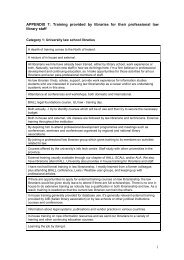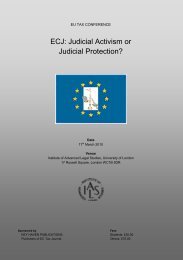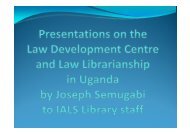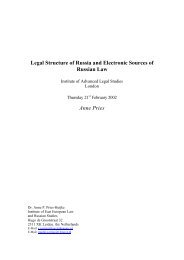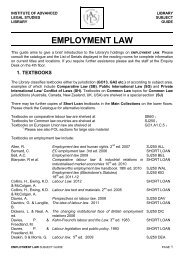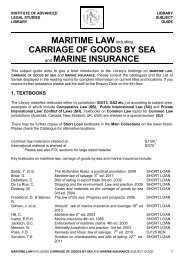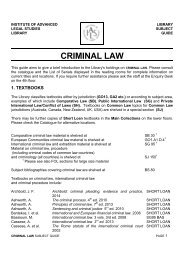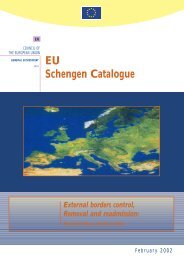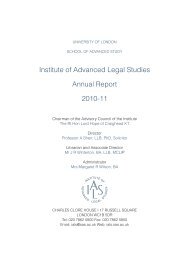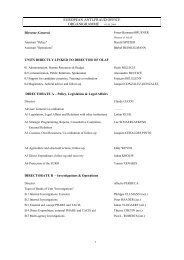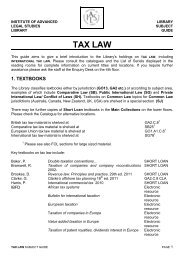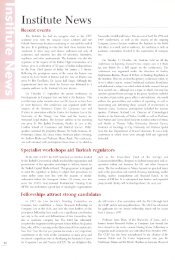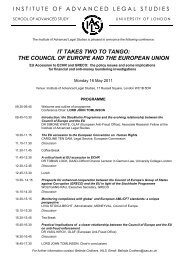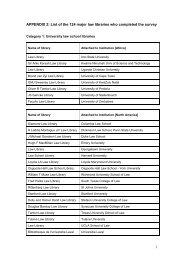a thesis - Institute of Advanced Legal Studies
a thesis - Institute of Advanced Legal Studies
a thesis - Institute of Advanced Legal Studies
You also want an ePaper? Increase the reach of your titles
YUMPU automatically turns print PDFs into web optimized ePapers that Google loves.
44 EXPRESS TRUSTS.<br />
notions <strong>of</strong> common sense. It is quite obvious that a man in<br />
pecuniary difficulties, having a great number <strong>of</strong> debts which he<br />
could not meet, might put his property in the hands <strong>of</strong> certain<br />
persons to realize and pay the creditors in the best way they could.<br />
.... If it were supposed that such a deed as that created an<br />
irrevocable trust in favour <strong>of</strong> every one <strong>of</strong> the persons who happened<br />
at the time to be a creditor, the result might have been very <strong>of</strong>ten<br />
monstrous. It would give him no opportunity <strong>of</strong> paying a creditor<br />
who was pressing; no opportunity <strong>of</strong> settling an action ; no opportunity<br />
<strong>of</strong> getting any food for himself or his family the next day,<br />
or redeeming property pledged. .... Such a deed as this is to<br />
be construed as a mandate, the same sort <strong>of</strong> mandate that a man<br />
gives when he gives his servant money, with directions to pay it in<br />
a particular way; it does not create any equitable or legal right in<br />
favour <strong>of</strong> a particular creditor." The principle has been applied<br />
in, amongst other cases, Wilding v. Richards (1845, 1 Coll. Ch. E.<br />
655) ; Cornthwaite v. Frith (1851, 4 De G-. & Sm. 552) ; Johns v.<br />
James (1878, 8 Ch. D. 744) ; KinJock v. Secretary <strong>of</strong> State for<br />
India (1882,7 App. Gas. 619); Hcnderson v. Rothschild (1886,<br />
33 Ch. D. 459), and In re Ashby (1892, 1 Q. B. 872).<br />
The rule applies not only to trusts for the payment <strong>of</strong> debts but<br />
<strong>of</strong> other sums <strong>of</strong> money. In Walwyn v. Coutts^ for instance, the<br />
trust was for payment <strong>of</strong> annuities. It applies whether the debts<br />
or sums <strong>of</strong> money are owing by the assignor or another—in Walwyn<br />
v. Coutts they were owing by the assignor's son—and it is immaterial<br />
whether the creditors or persons to whom the sums are<br />
owing are specified or not; in Walwyn v. Coutts and Garrard v.<br />
Lauderdale they were specified; in Acton v. Woodgate they were<br />
not.<br />
Although the trust is revocable, it was decided in Glegg v. Rees<br />
(1871, L. E. 7 Ch. App. 71) that the property in these cases vests in<br />
the trustee until the trust is revoked, and he can maintain a suit<br />
therefor without joining the creditors.<br />
The following cases are illustrations <strong>of</strong> the application <strong>of</strong> the<br />
rule:—<br />
Illustrations.<br />
1. A. conveys property to X. and T. for the purpose <strong>of</strong> paying<br />
<strong>of</strong>f annuities granted by B. (A.'s son). The annuities are men-



